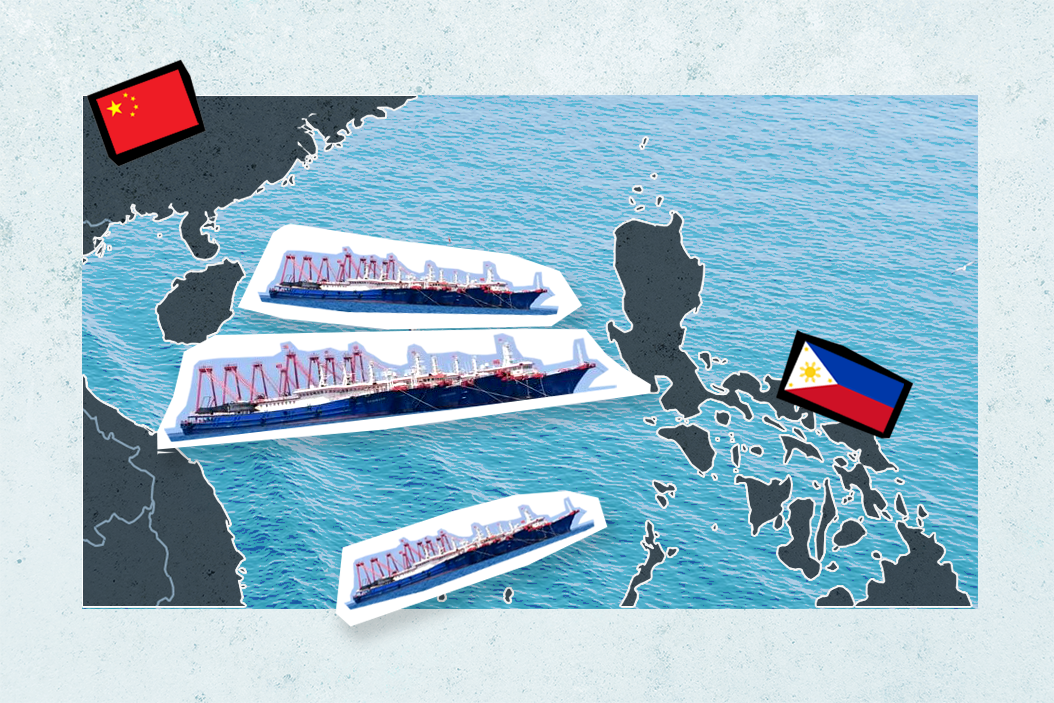The Philippines on Monday demanded China withdraw a massive fishing fleet — presumably commanded by the Chinese navy — from waters that Manila has exclusive economic rights over in the South China Sea. Beijing, unsurprisingly, denied any involvement. But there's more to the latest milestone in China's increasingly aggressive strategy to assert its claims in one of the world's most disputed waterways.
"Little blue men." One of China's preferred tactics to win control of the South China Sea without a fight is by deploying its armed maritime militia to do the dirty work for its navy under the guise of "fishing." Their members have been dubbed China's "little blue men" because their role is similar to that of Vladimir Putin's famous "little green men," the Russian soldiers without official insignias who invaded eastern Ukraine on behalf of Moscow in 2014.
Having members of the Chinese navy masquerade as fisherfolk in the South China Sea is nothing new. What's different this time is the sheer scale of the flotilla: a whopping 220 vessels, no match for the ill-equipped Philippine navy and coast guard, not to mention the local fishing boats who have long complained of China chasing them out of their own waters.
China is winning in the South China Sea. For decades, China has claimed indisputable maritime rights to almost the entire South China Sea, the main commercial and navigation gateway to East Asia. About one-third of global shipping passes through these waters, which are also believed to be immensely rich in fisheries and (largely untapped) hydrocarbons. That's why the Chinese will do whatever it takes to control these waters, parts of which are also claimed by Brunei, Malaysia, the Philippines, Taiwan, and Vietnam.
As China's power has risen in recent years, so too has Beijing's determination to assert its dominance over the South China Sea. All attempts by other claimants and the US navy to challenge its provocative actions — such as building military facilities on artificial islands, disrupting freedom of navigation operations, and depleting local fish stocks — have all failed to deter China.
The US, the only individual nation with the military muscle to pose a threat to China, is no longer a major player in the dispute. Last summer, Washington recognized a 2016 international ruling — in response to a lawsuit filed by the Philippines — that struck down China's sovereignty claims (Beijing rejects the verdict). But both sides know that Americans have little appetite to go to war with China, let alone over a body of water halfway around the world.
Duterte and China. The latest incident with China in the South China Sea has put Philippine President Rodrigo Duterte in a bind. The otherwise tough-talking leader is notorious for his soft-spoken deference towards China, arguing that the Philippines is too weak to risk a confrontation with such a mighty rival.
Many Filipinos who view China with growing distrust oppose Duterte's perceived kowtowing to Beijing in exchange for Chinese investment to fix the country's dilapidated infrastructure. The promise of that much-needed cash explains his reluctance to raise the 2016 ruling with Beijing, and consent to jointly explore for oil and gas in disputed areas.
But this time Duterte has at least two reasons to show he's not Xi Jinping's puppet. Although his personal approval ratings remain high, the government has faced strong criticism for its dismal pandemic response, and for delaying the country's vaccine rollout by prioritizing Chinese-made COVID vaccines over others. Also, relations with China will likely become a major campaign issue in the May 2022 election (where Duterte himself could be on the ballot as a candidate for vice president to skirt the presidential one-term limit).
What happens next? The ailing Philippine economy is so
dependent on Chinese trade that it seems unlikely Duterte will take any significant action to counter Beijing's latest swipe, no matter the political risk. And with Washington having
more pressing issues to sort out with Beijing these days, China's "little blue men" are set to rule the waves in the South China Sea.
